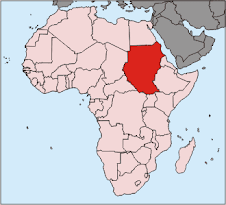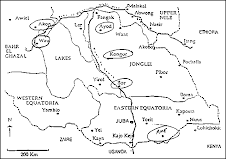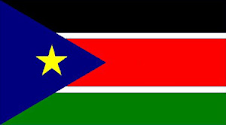 The Home:
The Home:
Part of the AIM missionary experience is living with an African family in order to get a feel for how Africans live, what their culture is really like, and also to established relationships. This experience is called a “home-stay”. During the first week of December I stayed in a tent at the home of Pastor Peter and Beatrice and their family. Peter and his family (Beatrice, their three girls, and Beatrice’s mother) live in the old parish house right next to the Africa Inland Church. The house was partially destroyed during the war so the family is only using two small rooms out of the whole house while Peter continues to make improvements on the other areas. Peter’s family is not the only one in the church compound. There are at least two other families that live on the compound and several young men that live somewhere close to, if not on, the compound. The families are constantly interacting with one another as if they are one big family. It is not unusual for there to be five or more people at Peter’s house in addition to the six that already live there.
Peace
The Family:
Peter and Beatrice have three beautiful little girls and they do an amazing job of parenting each one. In Africa, parents are not always available to really parent their children; to play, let alone interact, with their children. The mother is usually busy preparing meals, getting water, or doing whatever else. The father is usually working in town or in different countries for better pay, or unemployed and a drunk. I know that last scenario sounds really harsh but it’s actually very common in Sudan. Families are also so large that the children rarely get individualized attention. But these things are not the case for Peter and Beatrice. They, too, are busy with the daily chores of life but they make it a point to show their children attention. Their parenting shows in each of their child’s development. Their eldest daughter, Amama, is an intelligent girl of about six- or seven-years and very much like her father. She is a natural leader and it shows in her composure and interaction with other children. She also has a side of her mother in her because she is already a very helpful, hospitable girl. The first morning I was there she brought me some water so that I could wash my hands before taking tea. Peace is about three- or four-years and very stubborn. For such a young girl, she is already very strong-willed. She knows exactly what she wants. But she is also a very happy child and just loves to play. When I was there she would climb up on my lap and play with my watch or the hair tie on my wrist. She also loves playing with buttons or zippers. It doesn’t really take much to entertain Peace. Linda Hope is only a few months old but she is so alert. She has huge brown eyes and a sweet smile. She laughs frequently at the littlest things. She is very laid-back and I can’t even remember her ever crying while I was there except for when she was hungry.
 The Experience:
The Experience:
I would spend the early mornings, late afternoons, and evenings with Peter and Beatrice. In the mornings I would get up and get ready before leaving my tent. I would then try to help Beatrice with breakfast but normally she wouldn’t let me help so I just watched. I watched her make mandazis the first morning I was there. A mandazi is kind of like a triangular donut. I usually took tea and mandazis with Peter and few of the other men. I never had breakfast with Beatrice and her mother since I was a guest. In the African culture, the women usually eat after the men or away from the men. Rarely do they eat in the company of one another. After breakfast I would spend my day either at the hospital or the pre-school. Later in the day after my work, I would go back to the Byler’s house just to get away and have some alone time or do some computer work. Here in Sudan, it seems you are constantly surrounded by people, especially when you live in a setting like Peter and Beatrice.

The Women of Good News
I usually made my way back to the church compound around four or five. As soon as I’d get there I would have dinner with Peter. We would talk about our days and he would teach me some Arabic. Luckily during these times it was still light enough that I could write these things down. I would play with Amama and Peace after dinner up until bath time. Right before bed, we all gathered together outside under the stars and had a nightly devotional. Usually this gathering consisted of Peter’s family, me, and some of the young boys/men in the church compound. Peter led the devotional in Arabic so that the children would understand. Daniel, a young man from the church, would translate for me. We started the devotional in song and prayer then someone would give a mini-sermon (I gave one the third night I was there). We ended in prayer and usually another song. I loved that this time was set aside every night for the entire family to gather and worship God. Not only is it a great example to their children but it’s a great example to those in the church compound. The nightly devotionals were probably my favorite part of my time with Peter’s family.

At the end of the week there was a women’s retreat for the AIC Women of Good News. These women traveled to Torit from all over South Sudan to attend this 3-day retreat. I knew that the retreat was going to take place but I don’t think I realized just how many women would be participating or where they were going to be staying. When I returned to the compound that Wednesday evening, I saw that there were many women and children there. It was then that I realized that these women were attending the retreat and they would be staying at the church compound. A few of the women and children stayed in tents in front of Peter’s house but the rest of the women slept on tarps on the church floor. Thursday evening brought even more women and children, along with an even more overwhelming atmosphere for me. At first it was just awkward being the only “girl” surrounded by “women”. In Sudan, you are still considered a “girl” until you are married. After a while some of the women began including me in their conversation which was slightly difficult since very few of them spoke English. Some of the women didn’t even speak Arabic, only their mother tongue (mainly Acholi or Lotuko). Sometimes it was very difficult to even find a common ground. Devotionals started later than usual that night, but shortly after they were finished I went to bed. I didn’t realize how exhausting it can be to be constantly around people. As soon as I got into my tent, the women began singing. At first it was really neat because they were singing Christmas hymns in Arabic. As the night wore on the songs got louder and they began dancing. The women were performing their shrills (just a high-pitch shrill noise), laughing, singing and dancing. The music went on well into the night. Although sleep was hard to come by that night, it was so amazing to hear the women worshiping God under the stars with their sisters.

Angelina and Bianca
My home-stay was very short and ended quite abruptly due to the women’s retreat. I would have stayed longer but I know that with all the women around I would have been overwhelmed the remainder of my stay. I also wasn’t able to see the family interacting as they normally do since Beatrice’s duties had shifted while the Women of Good News were there. I am thankful that God provided me with the opportunity to stay with Peter and his family even if it was only a short time. I am looking forward to spending more time with that family in the future: chatting with Peter over tea, learning Arabic from Beatrice, and playing with the girls.

Peace and Amama
 The Home:
The Home:











No comments:
Post a Comment